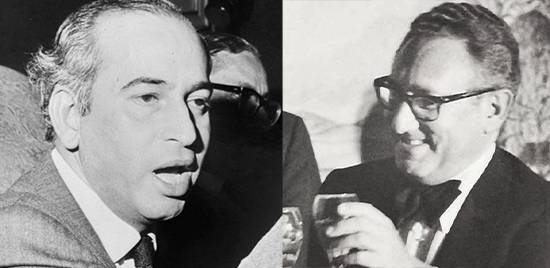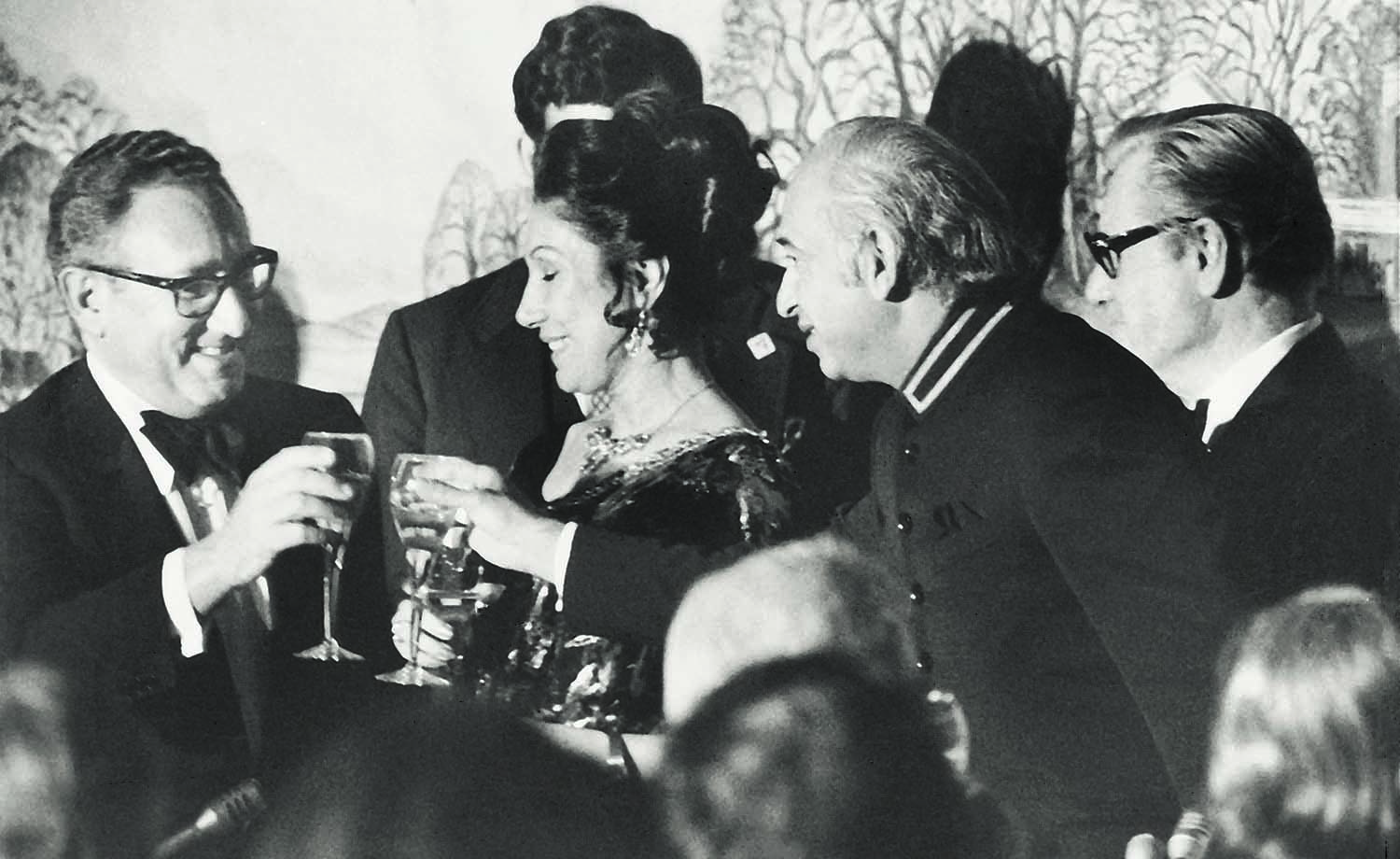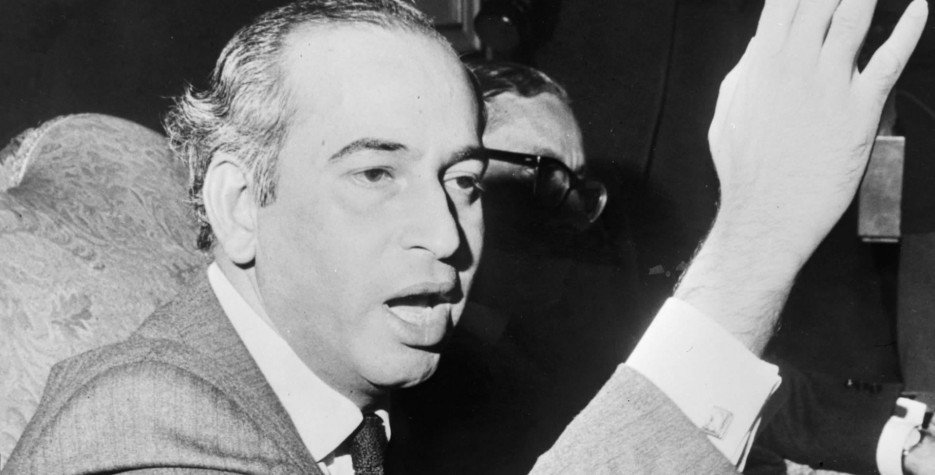
It is a widely believed myth in Pakistan that Henry Kissinger threatened Zulfikar Ali Bhutto to make a “horrible example” of him and his country. Interestingly, the creator of this myth was Benazir Bhutto, not Zulfikar Ali Bhutto. Benazir Bhutto claimed in an interview with an American television channel that she was an eyewitness to the heated exchange between her father and Kissinger.
Despite my best efforts, I couldn’t get hold of the original transcript of this interview. However, I was able to find Indian magazine, India Today, that in a cover story in 1994, reproduced excerpts from Benazir Bhutto’s statement to the TV channel. According to the magazine, “In an interview with NBC News… Benazir Bhutto said that she remembered the heated exchange between her father and Kissinger quite vividly, “I was in the hall at the time Henry Kissinger came in and said, ‘We will make a horrible example out of you’.”
In the June 10, 1977, while addressing the National Assembly debate on the US pressure to cancel a (reprocessing plant) deal, Z.A. Bhutto disclosed that in September 1976 the US Secretary of State, Henry Kissinger, had warned Pakistan Ambassador to Washington that a democratic administration would make a “horrible example” of Pakistan if it did not cancel the deal -- and regardless of which party won the US elections, there would be “troubles galore” for Pakistan.

So, apparently, there are two differences between the statements of Benazir Bhutto and Z.A. Bhutto -- a) Benazir Bhutto said Kissinger directly threatened her father, whereas elder Bhutto said the threat was conveyed through Pakistan’s ambassador to Washington, b) Benazir apparently said that Kissinger used the word “We” when he threatened Bhutto, whereas Z.A. Bhutto said Kissinger conveyed that it was the Democrats in White House that would make a “horrible example” of Pakistan.
Regardless, we now commonly believe that Kissinger directly threatened Z.A. Bhutto, implying that Z.A. Bhutto’s hanging was related to the threat hurled at him by Kissinger.
The fact of the matter is that then US Secretary of State Henry Kissinger visited Pakistan in August 1976 and met then Prime Minister Zulfikar Ali Bhutto in Lahore. Thirty-years later, the memo on the meeting released by George Washington University’s National Security Archive in May 2006 doesn’t contain the words, “Horrible example”. Instead the memo states that Kissinger told Bhutto that the US intelligence felt offended when Bhutto insisted that Pakistan needed the reprocessing plant for its energy needs, and when Bhutto demanded that the US should not insist that Pakistan must give up the reprocessing plant. Kissinger made it clear: “What concerns us is how the reprocessing facilities were used at a certain point.”
After the meeting, Bhutto told the newsmen that he was satisfied with the talks.
Seemingly, Prime Minister Imran Khan is using this myth to present his case. He is alleging that a foreign power has threatened him and his government with dire consequences, implying that like Z.A. Bhutto he wants to run an independent foreign policy but is resisted by the powerful.

Earlier, Pakistan’s political elite equated independent foreign policy with freedom to pursue a jingoistic foreign policy vis-à-vis India, right to go nuclear (this was before Pakistan’s nuclear status), to assist the Muslim freedom causes around the world, especially Kashmir and Palestine. In popular imagination, jingoism and ultra-nationalism tantamount to independent foreign policy.
According to this narrative, PM Khan is pursuing an independent foreign policy, therefore, the world powers are hedging the opposition parties against him. Khan has however failed to explain what aspect of his government’s foreign policy has offended the foreign powers. Maybe his “Absolutely not” to the US request for air bases after the end of the Afghan war.
Pakistan was born when the Cold War was heating up. The then Pakistani leaders formulated a foreign policy that put all the eggs in the US basket. They wanted the US to neutralize the military threat from India. But when the US imposed military sanctions on Pakistan after the 1965 wars, Pakistan turned to another extra regional power, China. This was seen as an unsatisfactory move as China was a poor, third world power back then. Pakistan turned to the Arabs then.
The hard truth is that the feeble political elite of Pakistan has failed to create a self-sustaining economic base in the country to run an independent foreign policy.
Despite my best efforts, I couldn’t get hold of the original transcript of this interview. However, I was able to find Indian magazine, India Today, that in a cover story in 1994, reproduced excerpts from Benazir Bhutto’s statement to the TV channel. According to the magazine, “In an interview with NBC News… Benazir Bhutto said that she remembered the heated exchange between her father and Kissinger quite vividly, “I was in the hall at the time Henry Kissinger came in and said, ‘We will make a horrible example out of you’.”
In the June 10, 1977, while addressing the National Assembly debate on the US pressure to cancel a (reprocessing plant) deal, Z.A. Bhutto disclosed that in September 1976 the US Secretary of State, Henry Kissinger, had warned Pakistan Ambassador to Washington that a democratic administration would make a “horrible example” of Pakistan if it did not cancel the deal -- and regardless of which party won the US elections, there would be “troubles galore” for Pakistan.

So, apparently, there are two differences between the statements of Benazir Bhutto and Z.A. Bhutto -- a) Benazir Bhutto said Kissinger directly threatened her father, whereas elder Bhutto said the threat was conveyed through Pakistan’s ambassador to Washington, b) Benazir apparently said that Kissinger used the word “We” when he threatened Bhutto, whereas Z.A. Bhutto said Kissinger conveyed that it was the Democrats in White House that would make a “horrible example” of Pakistan.
Regardless, we now commonly believe that Kissinger directly threatened Z.A. Bhutto, implying that Z.A. Bhutto’s hanging was related to the threat hurled at him by Kissinger.
Khan has however failed to explain what aspect of his government’s foreign policy has offended the foreign powers. Maybe his “Absolutely not” to the US request for air bases after the end of the Afghan war.
The fact of the matter is that then US Secretary of State Henry Kissinger visited Pakistan in August 1976 and met then Prime Minister Zulfikar Ali Bhutto in Lahore. Thirty-years later, the memo on the meeting released by George Washington University’s National Security Archive in May 2006 doesn’t contain the words, “Horrible example”. Instead the memo states that Kissinger told Bhutto that the US intelligence felt offended when Bhutto insisted that Pakistan needed the reprocessing plant for its energy needs, and when Bhutto demanded that the US should not insist that Pakistan must give up the reprocessing plant. Kissinger made it clear: “What concerns us is how the reprocessing facilities were used at a certain point.”
After the meeting, Bhutto told the newsmen that he was satisfied with the talks.
Seemingly, Prime Minister Imran Khan is using this myth to present his case. He is alleging that a foreign power has threatened him and his government with dire consequences, implying that like Z.A. Bhutto he wants to run an independent foreign policy but is resisted by the powerful.

Earlier, Pakistan’s political elite equated independent foreign policy with freedom to pursue a jingoistic foreign policy vis-à-vis India, right to go nuclear (this was before Pakistan’s nuclear status), to assist the Muslim freedom causes around the world, especially Kashmir and Palestine. In popular imagination, jingoism and ultra-nationalism tantamount to independent foreign policy.
According to this narrative, PM Khan is pursuing an independent foreign policy, therefore, the world powers are hedging the opposition parties against him. Khan has however failed to explain what aspect of his government’s foreign policy has offended the foreign powers. Maybe his “Absolutely not” to the US request for air bases after the end of the Afghan war.
Pakistan was born when the Cold War was heating up. The then Pakistani leaders formulated a foreign policy that put all the eggs in the US basket. They wanted the US to neutralize the military threat from India. But when the US imposed military sanctions on Pakistan after the 1965 wars, Pakistan turned to another extra regional power, China. This was seen as an unsatisfactory move as China was a poor, third world power back then. Pakistan turned to the Arabs then.
The hard truth is that the feeble political elite of Pakistan has failed to create a self-sustaining economic base in the country to run an independent foreign policy.

